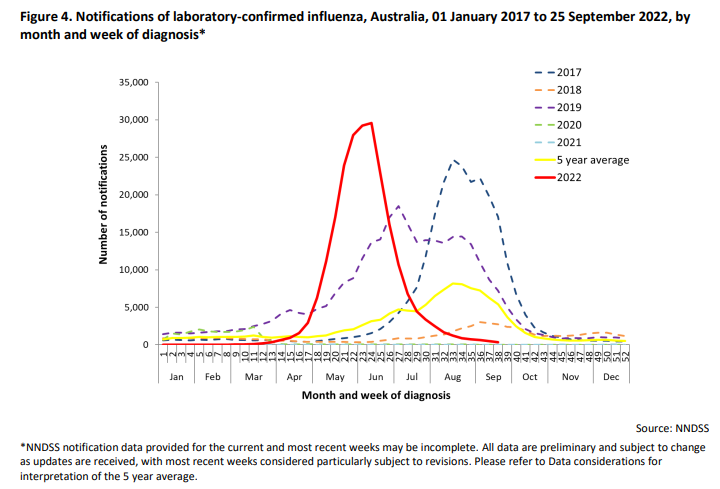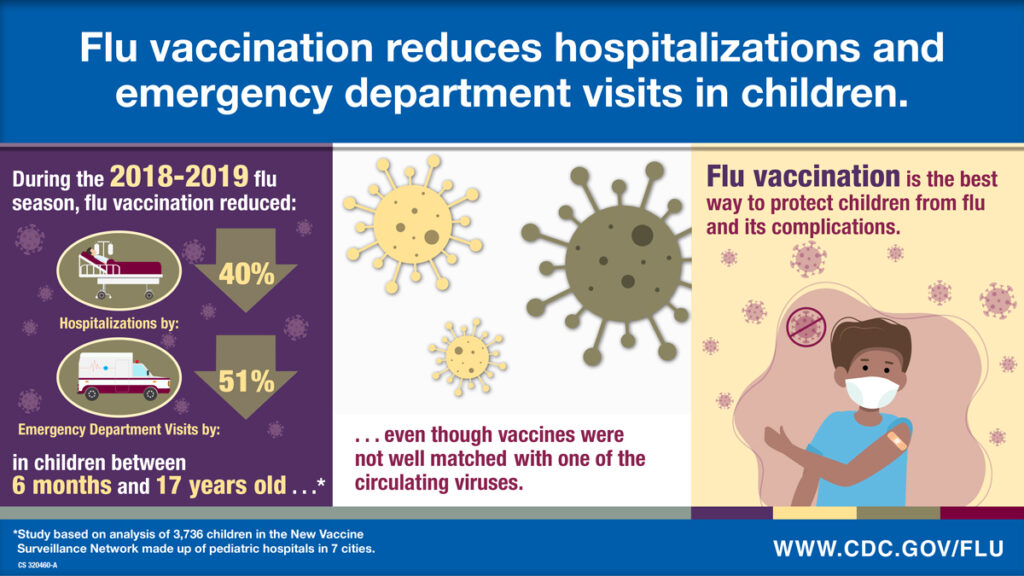
What is influenza?
Influenza is a highly contagious respiratory illness that is spread through contact with microscopic water particles in the air.
The typical symptoms are:
- Abrupt onset of high fever
- Headache
- Body aches
- Sore throat
- Coughing
- Vomiting (in some cases)
The nickname, “flu”, is sometimes used to refer to several different diseases. The “stomach flu” is a virus that gets into the intestines, causing vomiting and diarrhea, whereas “Influenza” is a respiratory infection. The “flu shot”, or more precisely, the “influenza vaccine” will not prevent the stomach flu, nor will it prevent common colds or other types of illness.
What will the flu season be like this year?
We have seen unusually low influenza numbers over the past 2 years thanks to masking, social distancing, and reduced travel. However, while it is hard to predict what the upcoming season will be like, there are indications that this flu season will be much more severe.
What happens in the Southern Hemisphere during cold and flu season can help predict what the Northern Hemisphere may experience, and Australia has just been through its worst flu season of the past 5 years.
In addition, there are concerns about the possibility of a “twindemic”. In other words, an influenza outbreak layered on top of the current COVID-19 pandemic. If a patient were infected with both influenza and COVID-19 at the same time, that could be much more devastating.
Do kids need flu shots?
Yes, children are susceptible to severe illness from the flu. Unfortunately, every year many people become extremely ill from influenza. Some need to be on breathing machines to support their failing lungs. In 2019, the year before COVID-19 began circulating, 188 pediatric patients died from influenza in the United States.
Typically, 80% of the children who die are unvaccinated and the majority were previously healthy, without underlying health conditions.
The elderly are hit even harder. Typically, 20,000-50,000 elderly die of influenza each year. Getting vaccinated can help prevent spreading the disease to a frail grandparent or neighbor.
Do you need a flu shot every year?
Yes, yearly vaccines are recommended since immunity from the vaccine wanes over time. The influenza virus also changes and mutates into new variants or strains, so the composition of the vaccine needs to be adjusted every year to protect against the most common variants.
This year, all influenza vaccines protect against 4 strains of the virus, including H1N1. While the vaccine isn’t guaranteed to prevent all influenza infections, it does clearly reduce the severity of the disease.
Should I get a flu shot?
We strongly encourage everyone 6 months and older who are eligible to get vaccinated. Some people may experience mild side effects from the vaccine, such as a low fever or body aches for a day or two. The symptoms you would experience from an actual influenza infection without vaccination would typically be much more severe than any symptoms you might experience from the flu shot.
Influenza vaccines cannot give you the flu. Some who are vaccinated may later still become infected with influenza, but it will clearly be much milder than if that person got the disease without the boost in their immune system from the vaccine.
Not only does immunization help the one receiving it, but it also helps reduce the amount of influenza circulating in the community, thereby helping all those around as well. You never know if someone around you has a weakened immune system and would be more susceptible to complications or death.
The science is clear that the vaccine for influenza dramatically reduces the severity of the illness and the risk of hospitalization and death. So please, get vaccinated!
More information
- Seasonal Flu Vaccine Now Available at Pediatrics Northwest
- Not Just The Flu
- Which Flu Vaccine Should Children Get?
Cover image credit: Heather Hazzan, SELF Magazine.
Related Stories





